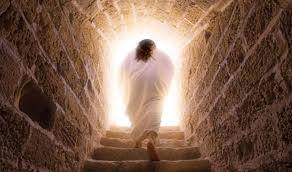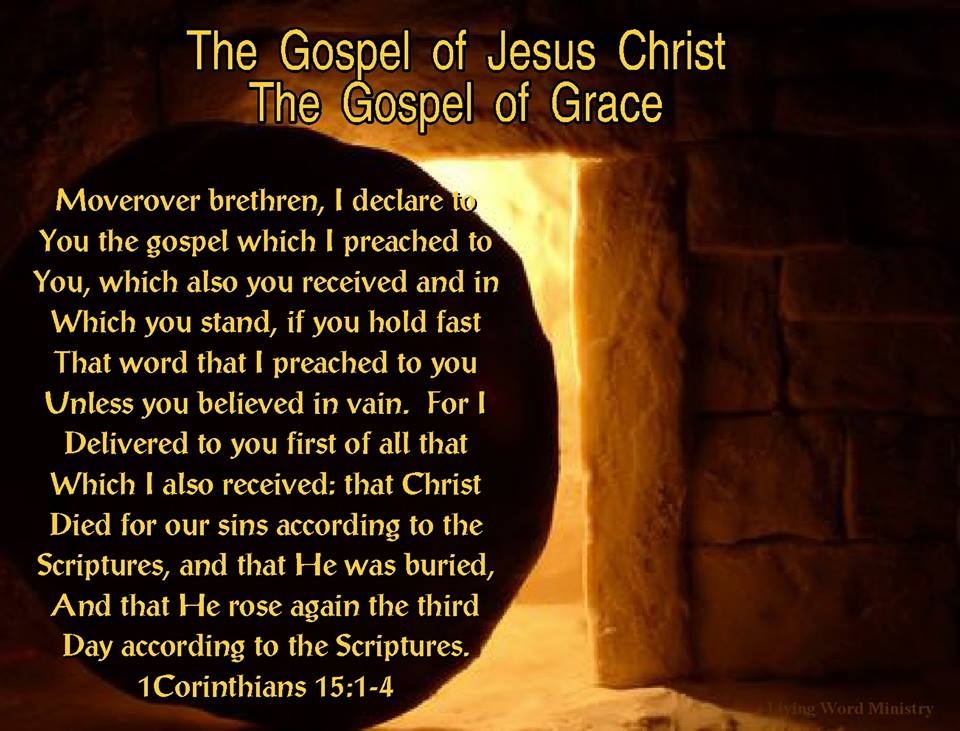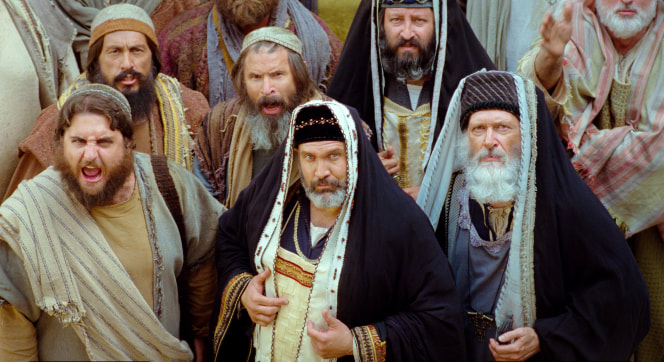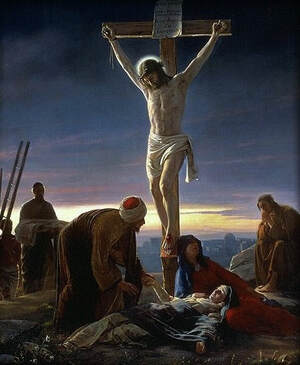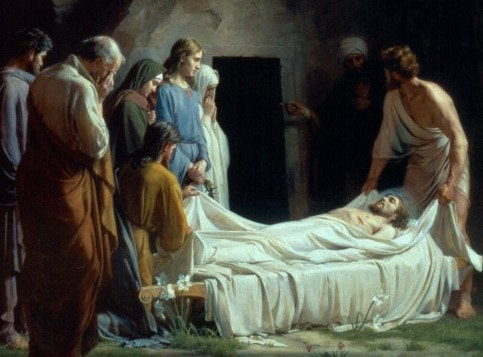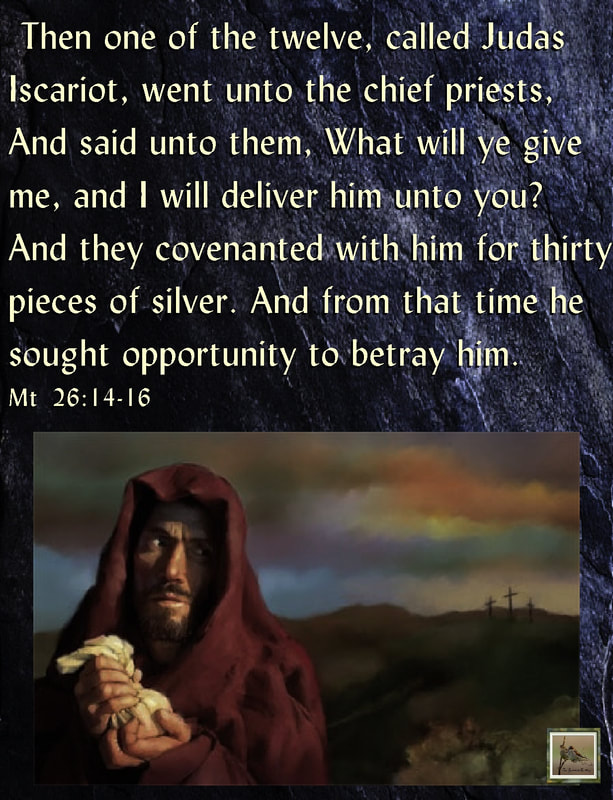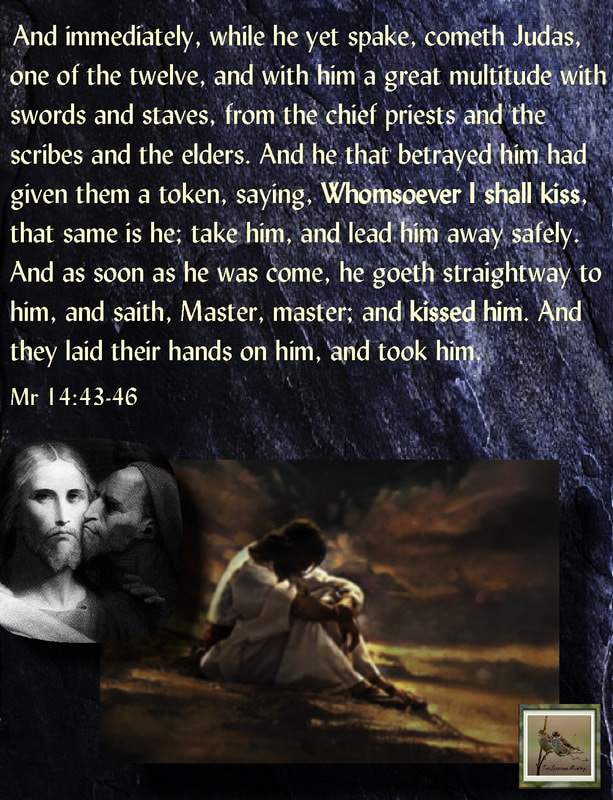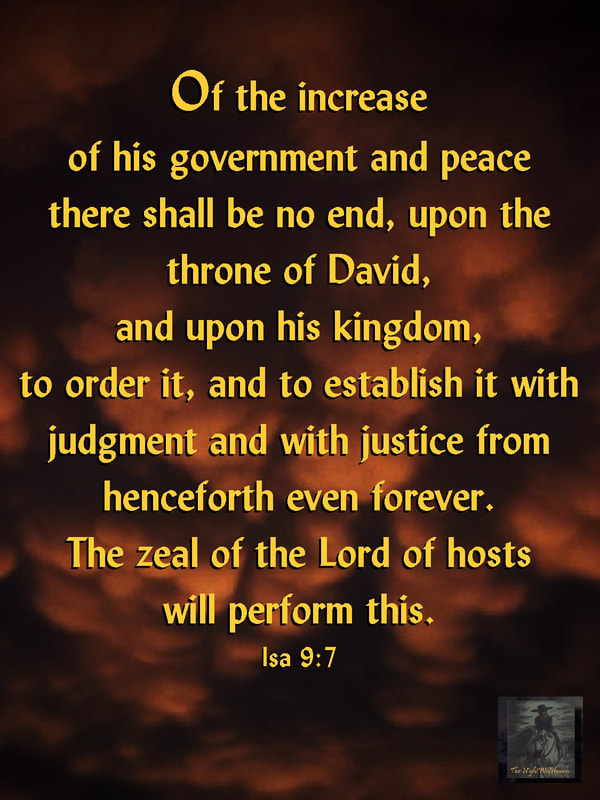|
The Resurrection Joh 20:1 The first day of the week cometh Mary Magdalene early, when it was yet dark, unto the sepulchre, and seeth the stone taken away from the sepulchre. She was not alone. Mary, the mother of James and Joses, and Salome were with her. Their object was to place spices about the body of Jesus. See notes on Mat_28:1-8. Compare Mar_16:1-8; Luk_24:1-11 Joh 20:2 Then she runneth, and cometh to Simon Peter, and to the other disciple, whom Jesus loved, and saith unto them, They have taken away the Lord out of the sepulchre, and we know not where they have laid him. Joh 20:3 Peter therefore went forth, and that other disciple, and came to the sepulchre. Joh 20:4 So they ran both together: and the other disciple did outrun Peter, and came first to the sepulchre. She ran to Peter and John to tell that the tomb is empty. Joh 20:5 And he stooping down, and looking in, saw the linen clothes lying; yet went he not in. Joh 20:6 Then cometh Simon Peter following him, and went into the sepulchre, and seeth the linen clothes lie, Joh 20:7 And the napkin, that was about his head, not lying with the linen clothes, but wrapped together in a place by itself. Joh 20:8 Then went in also that other disciple, which came first to the sepulchre, and he saw, and believed. Joh 20:9 For as yet they knew not the scripture, that he must rise again from the dead. Joh 20:10 Then the disciples went away again unto their own home. Jesus Appears to Mary Magdalene Joh 20:11 But Mary stood without at the sepulchre weeping: and as she wept, she stooped down, and looked into the sepulchre, Joh 20:12 And seeth two angels in white sitting, the one at the head, and the other at the feet, where the body of Jesus had lain. Joh 20:13 And they say unto her, Woman, why weepest thou? She saith unto them, Because they have taken away my Lord, and I know not where they have laid him. Joh 20:14 And when she had thus said, she turned herself back, and saw Jesus standing, and knew not that it was Jesus. Joh 20:15 Jesus saith unto her, Woman, why weepest thou? whom seekest thou? She, supposing him to be the gardener, saith unto him, Sir, if thou have borne him hence, tell me where thou hast laid him, and I will take him away. Joh 20:16 Jesus saith unto her, Mary. She turned herself, and saith unto him, Rabboni; which is to say, Master. Here we get the tone of passion and deep emotions-and Mary reaches out to embrace him-not able to contain her love. Why didn’t Jesus want Mary to touch Him? Actually, the ancient Greek construction of this phrase “means to stop an action already begun rather than to avoid starting it.” (Tenney) Mary was holding on to Jesus and did not want to let Him go. i. This shows that the resurrection body of Jesus was different, yet similar to His pre-resurrection body. It was definitely real and tangible, and Jesus not a phantom. ii. “Jesus was not protesting that Mary should not touch Him lest He be defiled, but was admonishing her not to detain Him because He would see her and the disciples again.” Jesus chooses to reveal Himself first to a woman-not any of the disciples. The fact that Jesus makes a woman the first witness of His resurrection is significant. The law courts of that day would not recognize the testimony of a woman, but Jesus did. He didn't appear first to Mary, his mother; this is significant because it shows she is not placed in any special category by the Lord. He reveals Himself after rising from the dead, to a woman whom he had delivered seven devils, this speaks volumes about who He considers worthy of His company. Mar 16:9 Now when Jesus was risen early the first day of the week, he appeared first to Mary Magdalene, out of whom he had cast seven devils. Joh 20:17 Jesus saith unto her, Touch me not; for I am not yet ascended to my Father: but go to my brethren, and say unto them, I ascend unto my Father, and your Father; and to my God, and your God. Joh 20:18 Mary Magdalene came and told the disciples that she had seen the Lord, and that he had spoken these things unto her. Jesus and Thomas Joh 20:24 But Thomas, one of the twelve, called Didymus, was not with them when Jesus came. Joh 20:25 The other disciples therefore said unto him, We have seen the Lord. But he said unto them, Except I shall see in his hands the print of the nails, and put my finger into the print of the nails, and thrust my hand into his side, I will not believe. Joh 20:26 And after eight days again his disciples were within, and Thomas with them: then came Jesus, the doors being shut, and stood in the midst, and said, Peace be unto you. Joh 20:27 Then saith he to Thomas, Reach hither thy finger, and behold my hands; and reach hither thy hand, and thrust it into my side: and be not faithless, but believing. Joh 20:28 And Thomas answered and said unto him, My Lord and my God. Joh 20:29 Jesus saith unto him, Thomas, because thou hast seen me, thou hast believed: blessed are they that have not seen, and yet have believed. From David Guzik comm. Now Thomas, called the Twin, one of the twelve, was not with them when Jesus came. The other disciples therefore said to him, “We have seen the Lord.” So he said to them, “Unless I see in His hands the print of the nails, and put my finger into the print of the nails, and put my hand into His side, I will not believe.” And after eight days His disciples were again inside, and Thomas with them. Jesus came, the doors being shut, and stood in the midst, and said, “Peace to you!” Then He said to Thomas, “Reach your finger here, and look at My hands; and reach your hand here, and put it into My side. Do not be unbelieving, but believing.” And Thomas answered and said to Him, “My Lord and my God!” Jesus said to him, “Thomas, because you have seen Me, you have believed. Blessed are those who have not seen and yet have believed.” a. Unless I see . . . I will not believe: Thomas is not a doubter, but an unbeliever who will not accept the valid testimony of others. b. Do not be unbelieving, but believing: Jesus explicitly repeats Thomas’ demands back to him. This must have been very impressive to Thomas, and very convincing. i. Do not be unbelieving, but believing: Jesus also plainly commands him to cease his unbelief and to start believing c. My Lord and my God: Both Lord and God were titles of deity, and Thomas boldly and explicitly assigns these titles to Jesus. Jesus accepts these titles, and did not tell Thomas, “Don’t call Me that.” d. Blessed are those who have not seen and yet have believed: There is a special promise blessing given to those who believe. The faith of Thomas is the climax of the book: Jesus has triumphed over sickness, sin, evil men, death and sorrow; now He conquers unbelief. e. Thomas is a good example in many ways. He refused to say he understood when he didn’t, he refused to pretend to believe when he didn’t. And when he did understand and believe, he went all the way and properly called Jesus Lord and God. The disbelief of the apostle is the means of furnishing us with a full and satisfactory demonstration of the resurrection of our Lord. Throughout the divine dispensations every doctrine and ever important truth is gradually revealed; and here we have a conspicuous instance of the progressive system. An angel first declares the glorious event; the empty sepulchre confirms the women's report. Christ's appearance to Mary Magdalene shewed that he was alive; that to the disciples at Emmaus proved that it was at the least the spirit of Christ; that to the eleven shewed the reality of his body; and the conviction given to Thomas proved it the self-same body that had been crucified. Incredulity itself is satisfied; and the convinced apostle exclaims, in the joy of his heart, "My Lord and my God!" Joh_20:16, Joh_20:31, Joh_5:23, Joh_9:35-38; Psa_45:6, Psa_45:11, Psa_102:24-28, Psa_118:24-28; Isa_7:14, Isa_9:6; Isa_25:9, Isa_40:9-11; Jer_23:5-6; Mal_3:1; Mat_14:33; Luk_24:52; Act_7:59-60; 1Ti_3:16; Rev_5:9-14 We see Jesus proclaimed God also in Titus- Tit 2:13 Looking for that blessed hope, and the glorious appearing of the great God and our Saviour Jesus Christ; From John Gill comm. "And the glorious appearing of the great God, and our Saviour Jesus Christ; not two divine persons, only one, are here intended; for the word: rendered "appearing", is never used of God the Father, only of the second person; and the propositive article is not set before the word "Saviour", as it would, if two distinct persons were designed; and the copulative "and" is exegetical, and may he rendered thus, "and the glorious appearing of the great God, even our Saviour Jesus Christ"; who, in the next verse, is said to give himself for the redemption of his people: so that here is a very illustrious proof of the true and proper deity of Christ, who will appear at his second coming; for of that appearance are the, words to be understood, as the great God, in all the glories and perfections of his divine nature; as well as a Saviour, which is mentioned to show that he will appear to the salvation of his people, which he will then put them in the full possession of; and that the brightness of his divine Majesty will not make them afraid: and this appearance will be a glorious one; for Christ will come in his own glory, in the glory of his deity, particularly his omniscience and omnipotence will be very conspicuous; and in his glory as Mediator, which will be beheld by all the saints; and in his glory as a Judge, invested with power and authority from his Father, which will be terrible to sinners; and in the glory of his human nature, with which it is now crowned; and in his Father's glory, in the same he had with him before the world was, and which is the same with his, and in that which he will receive from him as man and Mediator, and as the Judge of the whole earth; and in the glory of his holy angels, being attended with all his mighty ones: to which may be added, that saints will be raised from the dead, and with the living ones appear with Christ in glory, and make up the bride, the Lamb's wife, having the glory of God upon her; so that this will be a grand appearance indeed. Now this the Gospel directs, and instructs believers to look for, to love, to hasten to, most earnestly desire, and yet patiently wait for, most firmly believing that it will be: and this the saints have reason to look for, with longing desire and affection, and with pleasure, since it will be not only glorious in itself, but advantageous to them; they will then be glorified with Christ, and be for ever with him." From JFB comm. The great God and our Saviour Jesus — "There is but one Greek article to “God” and “Savior,” which shows that both are predicated of one and the same Being. “Of Him who is at once the great God and our Savior.” Also (2) “appearing” (epiphaneia) is never by Paul predicated of God the Father (Joh_1:18; 1Ti_6:16), or even of “His glory” (as Alford explains it): it is invariably applied to Christ’s coming, to which (at His first advent, compare 2Ti_1:10) the kindred verb “appeared” (epephanee), Tit_2:11, refers (1Ti_6:14; 2Ti_4:1, 2Ti_4:8). Also (3) in the context (Tit_2:14) there is no reference to the Father, but to Christ alone; and here there is no occasion for reference to the Father in the exigencies of the context. Also (4) the expression “great God,” as applied to Christ, is in accordance with the context, which refers to the glory of His appearing; just as “the true God” is predicated of Christ, 1Jn_5:20. The phrase occurs nowhere else in the New Testament, but often in the Old Testament. Deu_7:21; Deu_10:17, predicated of Jehovah, who, as their manifested Lord, led the Israelites through the wilderness, doubtless the Second Person in the Trinity. Believers now look for the manifestation of His glory, inasmuch as they shall share in it. Even the Socinian explanation, making “the great God” to be the Father, “our Savior,” the Son, places God and Christ on an equal relation to “the glory” of the future appearing: a fact incompatible with the notion that Christ is not divine; indeed it would be blasphemy so to couple any mere created being with God." I am not a date setter, and do not know the exact day or hour of the Lord's return. But, as Jesus said, when you see the signs he warned us of in Matt. Ch. 24- "look up, your redemption draws night". World events are telling me, we are close to His return. God's blessings to all this Easter Mat 6:9 After this manner therefore pray ye: Our Father which art in heaven, Hallowed be thy name. Mat 6:10 Thy kingdom come. Thy will be done in earth, as it is in heaven. Mat 6:11 Give us this day our daily bread. Mat 6:12 And forgive us our debts, as we forgive our debtors. Mat 6:13 And lead us not into temptation, but deliver us from evil: For thine is the kingdom, and the power, and the glory, for ever. Amen. Even so, come Lord Jesus 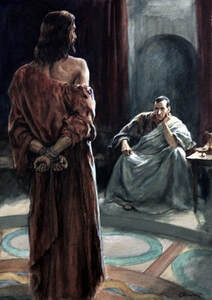 Jesus Before Pilate Joh 18:28 Then led they Jesus from Caiaphas unto the hall of judgment: and it was early; and they themselves went not into the judgment hall, lest they should be defiled; but that they might eat the passover. Joh 18:29 Pilate then went out unto them, and said, What accusation bring ye against this man? Joh 18:30 They answered and said unto him, If he were not a malefactor, we would not have delivered him up unto thee. Joh 18:31 Then said Pilate unto them, Take ye him, and judge him according to your law. The Jews therefore said unto him, It is not lawful for us to put any man to death: Joh 18:32 That the saying of Jesus might be fulfilled, which he spake, signifying what death he should die. From David Guzik comm.-"They led Jesus from Caiaphas to the Praetorium, and it was early morning. But they themselves did not go into the Praetorium, lest they should be defiled, but that they might eat the Passover. Pilate then went out to them and said, “What accusation do you bring against this Man?” They answered and said to him, “If He were not an evildoer, we would not have delivered Him up to you.” Then Pilate said to them, “You take Him and judge Him according to your law.” Therefore the Jews said to him, “It is not lawful for us to put anyone to death,” that the saying of Jesus might be fulfilled which He spoke, signifying by what death He would die." My Kingdom Is Not of This World Joh 18:33 Then Pilate entered into the judgment hall again, and called Jesus, and said unto him, Art thou the King of the Jews? From JFB comm.- "In Luk_23:2 they charge our Lord before Pilate with “perverting the nation, and forbidding to give tribute to Caesar, saying that He Himself is Christ a king.” Perhaps this was what occasioned Pilate’s question." Joh 18:34 Jesus answered him, Sayest thou this thing of thyself, or did others tell it thee of me? Joh 18:35 Pilate answered, Am I a Jew? Thine own nation and the chief priests have delivered thee unto me: what hast thou done? From JFB comm.-"that is, “Jewish questions I neither understand nor meddle with; but Thou art here on a charge which, though it seems only Jewish, may yet involve treasonable matter: As they state it, I cannot decide the point; tell me, then, what procedure of Thine has brought Thee into this position.” In modern phrase, Pilate’s object in this question was merely to determine the relevancy of the charge." Joh 18:36 Jesus answered, My kingdom is not of this world: if my kingdom were of this world, then would my servants fight, that I should not be delivered to the Jews: but now is my kingdom not from hence. From B.W. Johnson comm.-"It would be hard for Pilate to form any conception of a kingdom not of this world, a kingdom of which the subjects did not fight with carnal weapons to defend its king, or to extend its borders. He was a soldier and the representative of a monarch whose power rested on the sword. But such a kingdom was Christ's. It was not of this world, did not spring from it, was heavenly in its origin, and hence his servants would not fight that he should not be delivered to the Jews. (1) Christ's kingdom is supernatural, not of human origin. It is in the world, but not worldly. (2) It is maintained, not by carnal weapons, but by spiritual and moral means." Joh 18:37 Pilate therefore said unto him, Art thou a king then? Jesus answered, Thou sayest that I am a king. To this end was I born, and for this cause came I into the world, that I should bear witness unto the truth. Every one that is of the truth heareth my voice. From the JFB comm.- "John 18:37 Art thou a king then? — There was no sarcasm or disdain in this question (as Tholuck, Alford, and others, allege), else our Lord’s answer would have been different. Putting emphasis upon “thou,” his question betrays a mixture of surprise and uneasiness, partly at the possibility of there being, after all, something dangerous under the claim, and partly from a certain awe which our Lord’s demeanor probably struck into him. Thou sayest that I am a king — It is even so. To this end was I — “have I been.” born and for this cause came I — am I come. Into the world, that I may bear witness to the truth — His birth expresses His manhood; His coming into the world, His existence before assuming humanity: The truth, then, here affirmed, though Pilate would catch little of it, was that His Incarnation was expressly in order to the assumption of Royalty in our nature. Yet, instead of saying, He came to be a King, which is His meaning, He says He came to testify to the truth. Why this? Because, in such circumstances it required a noble courage not to flinch from His royal claims; and our Lord, conscious that He was putting forth that courage, gives a turn to His confession expressive of it. It is to this that Paul alludes, in those remarkable words to Timothy: “I charge thee before God, who quickeneth all things, and before Christ Jesus, who, in the presence of Pontius Pilate, witnessed the good confession” (1Ti_6:13). This one act of our Lord’s life, His courageous witness-bearing before the governor, was selected as an encouraging example of the fidelity which Timothy ought to display. As the Lord (says Olshausen beautifully) owned Himself the Son of God before the most exalted theocratic council, so He confessed His regal dignity in presence of the representative of the highest political authority on earth. Every one that is of the truth heareth my voice — Our Lord here not only affirms that His word had in it a self-evidencing, self-recommending power, but gently insinuated the true secret of the growth and grandeur of His kingdom - as A KINGDOM OF TRUTH, in its highest sense, into which all souls who have learned to live and count all things but loss for the truth are, by a most heavenly attraction, drawn as into their proper element; THE KING of whom Jesus is, fetching them in and ruling them by His captivating power over their hearts." Joh 18:38 Pilate saith unto him, What is truth? And when he had said this, he went out again unto the Jews, and saith unto them, I find in him no fault at all. From B.W. Johnson comm.-"What is truth? Pilate's inquiry was not answered in words, but Truth sat embodied and bound before him. Some have held that this question of Pilate's was asked in scorn. His conduct through the trial shows that he was deeply impressed, and it is probable that the question was asked from a deep curiosity to hear more from so marvelous a teacher." Comm. from F.B. Meyer- THE KING OF TRUTH "There was a tone of satire in Pilate’s question: “Thou poor, worn, tear-stained outcast, forsaken by every friend in this hour of need-art thou a king?” Human ears have never heard more majestic words than our Lord’s reply. But when He said, My kingdom is not of this world, He did not mean that it had nothing to do with this world, but that it did not originate here. It has descended from heaven, and seeks to bring the inspiration, principles, and methods of heaven into all the provinces of human activity. The one conspicuous proof of its absolutely foreign origin is its refusal to employ force. We do not fight, but sacrifice and suffer, for its maintenance. Our Lord therefore hastened to show that His Kingdom is based on the manifestation of the truth. There is no soul of man which is pure and true that does not recognize Christ’s royalty, as King of Truth, when it hears Him speak." Joh 18:39 But ye have a custom, that I should release unto you one at the passover: will ye therefore that I release unto you the King of the Jews? Joh 18:40 Then cried they all again, saying, Not this man, but Barabbas. Now Barabbas was a robber. From David Guzik comm.- "Pilate tries to release Jesus, but the crowd cries for Barabbas. “But you have a custom that I should release someone to you at the Passover. Do you therefore want me to release to you the King of the Jews?” Then they all cried again, saying, “Not this Man, but Barabbas!” Now Barabbas was a robber. a. Do you therefore want me to release to you the King of the Jews? Pilate looked for an easy way to escape a decision about Jesus, but he finds no easy escape. b. Not this Man, but Barabbas: The crowd, whom Pilate hoped would release Jesus, instead condemned Him. Because of this, Pilate found it impossible to go against both the Jewish leaders and the crowd. i. It is a strange, almost insane scene: a cruel, ruthless Roman governor trying to win the life of a miracle-working Jewish teacher against the efforts of both the Jewish leaders and the crowd. ii. How could the crowd turn so quickly against Jesus? There are many possible explanations. First, many of them were probably disappointed that this Messiah who rode into Jerusalem didn’t do what they wanted a Messiah to do. Second, there is a tendency in many people to tear down the very heroes they have built up; we see this in our culture today. iii. So the crowd rejected Jesus and embraced Barabbas, whose name means “son of the father,” and who was a terrorist and a murderer. If anyone should be able to say, “Jesus died for me,” it was Barabbas. He knew what it was to have Jesus die on his behalf, the innocent for the guilty." Joh 19:1 Then Pilate therefore took Jesus, and scourged him. Joh 19:2 And the soldiers platted a crown of thorns, and put it on his head, and they put on him a purple robe, Joh 19:3 And said, Hail, King of the Jews! and they smote him with their hands. Joh 19:4 Pilate therefore went forth again, and saith unto them, Behold, I bring him forth to you, that ye may know that I find no fault in him. Joh 19:5 Then came Jesus forth, wearing the crown of thorns, and the purple robe. And Pilate saith unto them, Behold the man! Excerpt from Edwards comm- Scourged Him: The brutal act of scourging had three purposes. First, it was used to beat the prisoner as a form of punishment. Second, it was used to extract a confession from the prisoner. Finally, in cases of crucifixion it was used to weaken the victim so he would die more quickly on the cross. i. As a tool to extract a confession, the Roman solider would beat the victim harder and harder until they confessed their crime. Because Jesus had nothing to confess, the blows never lightened on His back. ii. “Scourging was a legal preliminary to every Roman execution, and only women and Roman senators or soldiers (except in cases of desertion) were exempt.” iii. In regard to crucifixion, the goal of the scourging was to weaken the victim to a state just short of collapse and death. “As the Roman soldiers repeatedly struck the victim’s back with full force, the iron balls would cause deep contusions, and the leather thongs and sheep bones would cut into the skin and subcutaneous tissues. Then, as the flogging continued, the lacerations would tear into the underlying skeletal muscles and produce quivering ribbons of bleeding flesh. Pain and blood loss generally set the stage for circulatory shock. The extent of blood loss may well have determined how long the victim would survive the cross.” iv. “The severe scourging, with its intense pain and appreciable blood loss, most probably left Jesus in a pre-shock state. Moreover, hematidrosis had rendered his skin particularly tender. The physical and mental abuse meted out by the Jews and the Romans, as well as the lack of food, water, and sleep, also contributed to his generally weakened state. Therefore, even before the actual crucifixion, Jesus’ physical condition was at least serious and possibly critical.” I find no fault in Him: Pilate repeats his former finding not guilty. Standing before Pilate, bloody, and broken-he replies to Pilates threats: Joh 19:10 Then saith Pilate unto him, Speakest thou not unto me? knowest thou not that I have power to crucify thee, and have power to release thee? "This statement arouses the fear of Pilate. He had never seen such calm dignity and majesty before. Could this prisoner be divine? When Jesus is silent, Pilate reminds him that he has power to crucify or release." Joh 19:11 Jesus answered, Thou couldest have no power at all against me, except it were given thee from above: therefore he that delivered me unto thee hath the greater sin. "Jesus breaks the silence and at once assumes the position of Pilate's judge. He declares that Pilate could have no power over himself unless it were given him. Christ submitted because it was the Father's will that he should drink the cup. Poor, helpless Pilate was not so great a sinner as the Jews, who might have known better, who were filled with devilish hate, who were now forcing Pilate to the crime. The words of Christ are really words of compassion." Joh 19:14 And it was the preparation of the passover, and about the sixth hour: and he saith unto the Jews, Behold your King! From JFB comm.-"The true reading here is probably, “the third hour” - or nine a.m. - which agrees best with the whole series of events, as well as with the other Evangelists." Joh 19:15 But they cried out, Away with him, away with him, crucify him. Pilate saith unto them, Shall I crucify your King? The chief priests answered, We have no king but Caesar. From B.W. comm.-"We have no king but Cæsar. They had not now. They had rejected the divine King, had chosen Barabbas instead, for life, and now make choice of Cæsar as their king instead of the Lord's Anointed. To Cæsar's tender mercies they committed themselves, and in about a generation Cæsar will trample them in the wine press of wrath. The choice they had made sealed the fate of their city and nation." The Crucifixion Joh 19:16 Then delivered he him therefore unto them to be crucified. And they took Jesus, and led him away. Joh 19:17 And he bearing his cross went forth into a place called the place of a skull, which is called in the Hebrew Golgotha: Joh 19:18 Where they crucified him, and two other with him, on either side one, and Jesus in the midst. Joh 19:19 And Pilate wrote a title, and put it on the cross. And the writing was, JESUS OF NAZARETH THE KING OF THE JEWS. Joh 19:20 This title then read many of the Jews: for the place where Jesus was crucified was nigh to the city: and it was written in Hebrew, and Greek, and Latin. Joh 19:21 Then said the chief priests of the Jews to Pilate, Write not, The King of the Jews; but that he said, I am King of the Jews. Joh 19:22 Pilate answered, What I have written I have written. Joh 19:23 Then the soldiers, when they had crucified Jesus, took his garments, and made four parts, to every soldier a part; and also his coat: now the coat was without seam, woven from the top throughout. Joh 19:24 They said therefore among themselves, Let us not rend it, but cast lots for it, whose it shall be: that the scripture might be fulfilled, which saith, They parted my raiment among them, and for my vesture they did cast lots. These things therefore the soldiers did. Joh 19:25 Now there stood by the cross of Jesus his mother, and his mother's sister, Mary the wife of Cleophas, and Mary Magdalene. Joh 19:26 When Jesus therefore saw his mother, and the disciple standing by, whom he loved, he saith unto his mother, Woman, behold thy son! Joh 19:27 Then saith he to the disciple, Behold thy mother! And from that hour that disciple took her unto his own home. The Death of Jesus Joh 19:28 After this, Jesus knowing that all things were now accomplished, that the scripture might be fulfilled, saith, I thirst. Joh 19:29 Now there was set a vessel full of vinegar: and they filled a spunge with vinegar, and put it upon hyssop, and put it to his mouth. Joh 19:30 When Jesus therefore had received the vinegar, he said, It is finished: and he bowed his head, and gave up the ghost. Jesus' Side Is Pierced Joh 19:31 The Jews therefore, because it was the preparation, that the bodies should not remain upon the cross on the sabbath day, (for that sabbath day was an high day,) besought Pilate that their legs might be broken, and that they might be taken away. Joh 19:32 Then came the soldiers, and brake the legs of the first, and of the other which was crucified with him. Joh 19:33 But when they came to Jesus, and saw that he was dead already, they brake not his legs: Joh 19:34 But one of the soldiers with a spear pierced his side, and forthwith came there out blood and water. Joh 19:35 And he that saw it bare record, and his record is true: and he knoweth that he saith true, that ye might believe. Joh 19:36 For these things were done, that the scripture should be fulfilled, A bone of him shall not be broken. Joh 19:37 And again another scripture saith, They shall look on him whom they pierced. Jesus Is Buried Joh 19:38 And after this Joseph of Arimathaea, being a disciple of Jesus, but secretly for fear of the Jews, besought Pilate that he might take away the body of Jesus: and Pilate gave him leave. He came therefore, and took the body of Jesus. Joh 19:39 And there came also Nicodemus, which at the first came to Jesus by night, and brought a mixture of myrrh and aloes, about an hundred pound weight. Joh 19:40 Then took they the body of Jesus, and wound it in linen clothes with the spices, as the manner of the Jews is to bury. Joh 19:41 Now in the place where he was crucified there was a garden; and in the garden a new sepulchre, wherein was never man yet laid. Joh 19:42 There laid they Jesus therefore because of the Jews' preparation day; for the sepulchre was nigh at hand. Rise Again- Dallas Holm- https://youtu.be/APuy2dJrqYk 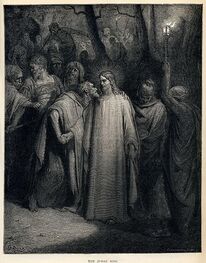 The Hour of Darkness As the Passover supper was ended-the drama unfolds of the agony, suffering, and majesty of the willing sacrifice Jesus endured-the hour of the power of darkness. Institution of the Lord's Supper Luk 22:14 And when the hour was come, he sat down, and the twelve apostles with him. Luk 22:15 And he said unto them, With desire I have desired to eat this passover with you before I suffer: Luk 22:16 For I say unto you, I will not any more eat thereof, until it be fulfilled in the kingdom of God. Luk 22:17 And he took the cup, and gave thanks, and said, Take this, and divide it among yourselves: Luk 22:18 For I say unto you, I will not drink of the fruit of the vine, until the kingdom of God shall come. Luk 22:19 And he took bread, and gave thanks, and brake it, and gave unto them, saying, This is my body which is given for you: this do in remembrance of me. Luk 22:20 Likewise also the cup after supper, saying, This cup is the new testament in my blood, which is shed for you. Luk 22:21 But, behold, the hand of him that betrayeth me is with me on the table. Luk 22:22 And truly the Son of man goeth, as it was determined: but woe unto that man by whom he is betrayed! Luk 22:23 And they began to enquire among themselves, which of them it was that should do this thing. Betrayal and Arrest of Jesus Luk 22:47 And while he yet spake, behold a multitude, and he that was called Judas, one of the twelve, went before them, and drew near unto Jesus to kiss him. Luk 22:48 But Jesus said unto him, Judas, betrayest thou the Son of man with a kiss? In this event we see the full disclosure of the god of this world, and how he operates. 1. This man spent three years walking with, and watching Jesus in his ministry. He saw the miracles, the healings, the acts of compassion-it did not move him, or change his heart. 2. While he walked and pretended to serve in this ministry-his intentions were apparently noted by some of the disciples, he is described as a thief, because he held the "bag" of the treasury of the ministry: Joh 12:4 Then saith one of his disciples, Judas Iscariot, Simon's son, which should betray him, Joh 12:5 Why was not this ointment sold for three hundred pence, and given to the poor? Joh 12:6 This he said, not that he cared for the poor; but because he was a thief, and had the bag, and bare what was put therein. He cared nothing for the poor-his interest was self-oriented. He had a keen sense of the value of money, but no appreciation of what God valued. To him, expressing that much love to Jesus was too much. 3. There's only one thing the devil loves-himself. The kiss was a charade, the stamp of treachery from an evil heart. It revealed his true character. How deceptive appearances can be-we can see it very evident in this world today. A façade of integrity and religious zeal-but inward, full of treachery. Let's go further into the details of this hour of darkness, to get a clearer picture of the people involved, and Judas.
Expositor's bible excerpt: What with the cunning of the high priests and the cold calculations of Judas, whose mind was practiced in weighing chances and providing for contingencies, the plot is laid deeply and well. No detail is omitted: the band of soldiers, who shall put the stamp of officialism upon the procedure, while at the same time they cower the populace and repress any attempt at rescue; the swords and staves, should they have to resort to force; the lanterns and torches, with which to light up the dark hiding-places of the garden; the cords or chains, with which to bind their Prisoner; the kiss, which should be at once the sign of recognition and the signal for the arrest, all are prearranged and provided; while back of these the high priests are keeping their midnight watch, ready for the mock trial, for which the suborned witnesses are even now rehearsing their, parts. Could worldly prudence or malicious skill go farther? Stealthily as the leopard approaches its victim, the motley crowd enter the garden, coming with muffled steps to take and lead away the Lamb of God. Only the glimmer of their torches gave notice of their approach, and even these burned dull in the intense moonlight. But Jesus needed no audible or visible warning, for He Himself knew just how events were drifting, reading the near future as plainly as the near past; and before they have come in sight He has awoke the three sleeping sentinels with a word which will effectually drive slumber from their eyelids: "Arise, let us be going: behold, he is at hand that betrayeth Me". (Mat_26:46) It will be seen from this that Jesus could easily have eluded His pursuers had He cared to do so. Even without any appeal to His supernatural powers, He could have withdrawn Himself under cover of the night, and have left the human sleuth-hounds foiled of their prey and vainly baying at the moon. But instead of this, He makes no attempt at flight. He even seeks the glades of Gethsemane, when by simply going elsewhere He might have disconcerted their plot and brought their counsel to naught. And now He yields Himself up to His death, not passively merely, but with the entire and active concurrence of His will. He "offered Himself," as the writer of the Epistle to the Hebrews expresses it, (Heb_9:14) a free-will Offering, a voluntary Sacrifice. He could, as He Himself said, have called legions of angels to His help; but He would not give the signal, though it were no more than one uplifted, look and so He does not refuse even the kiss of treachery; He suffers the hot lips of the traitor to burn His cheeks; and when others would have shaken off the viper into the fire, or have crushed it with the heel of a righteous indignation, Jesus receives patiently the stamp of infamy, His only word being a question of surprise, not at the treachery itself, but at its mode: "Betrayest thou the Son of man with a kiss?" And when for the moment, as St. John tells us, a strange awe fell upon the multitude, and they "went backward and fell to the ground," Jesus, as it were, called in the outshining glories, masking them with the tired and blood-stained humanity that He wore, so stilling the tremor that was upon His enemies, as He nerved the very hands that should take Him. And again, when they do bind Him, He offers no resistance; but when Peter’s quick sword flashes from its scabbard, and takes off the right ear of Malchus, the servant of the high priest, and so one of the leaders in the arrest, Jesus asks for the use of His manacled hand-for so we read the "Suffer ye thus far"-and touching the ear, heals it at once. He Himself is willing to be wounded even unto death, but His alone must be the wounds. His enemies must not share His pain, nor must His disciples pass with Him into this temple of His sufferings; and He even stays to ask for them a free parole: "Let these go their way." When I read the account of Jesus' betrayal, the Holy Spirit always opens new aspects of His response to this contrived treachery. Some added points from another commentary: Jesus is betrayed and arrested. And while He was still speaking, behold, a multitude; and he who was called Judas, one of the twelve, went before them and drew near to Jesus to kiss Him. But Jesus said to him, “Judas, are you betraying the Son of Man with a kiss?” When those around Him saw what was going to happen, they said to Him, “Lord, shall we strike with the sword?” And one of them struck the servant of the high priest and cut off his right ear. But Jesus answered and said, “Permit even this.” And He touched his ear and healed him. Then Jesus said to the chief priests, captains of the temple, and the elders who had come to Him, “Have you come out, as against a robber, with swords and clubs? When I was with you daily in the temple, you did not try to seize Me. But this is your hour, and the power of darkness.” (Luk_22:47-53) a. Drew near to Jesus to kiss Him: Apparently, Jesus was normal enough in appearance so that it was necessary that Judas specifically identify Him for the sake of those arresting Jesus, and he chose to identify Him by greeting Jesus with a kiss. b. Judas, are you betraying the Son of Man with a kiss? Of course, Jesus knew the irony of being betrayed with a warm greeting; so He essentially asked Judas “are you so dead to all feeling that you can kiss and betray?” Judas is a good example of a seared conscience. John Gill comm. There's an important point to bring out here. After he betrayed Jesus, Judas was so overcome with remorse-he went out and hung himself. He could have fallen on his knees and repented, God would have forgiven him. But, he didn't. How do I know this-because Peter did the same thing, when he denied Jesus three times after He was taken prisoner, and brought before Pilate. Peter's sin, was just as great as Judas'- it was Peter's repentance from the heart, that made the difference. Peter Denies Jesus Mat 26:69 Now Peter sat without in the palace: and a damsel came unto him, saying, Thou also wast with Jesus of Galilee. Mat 26:70 But he denied before them all, saying, I know not what thou sayest. Mat 26:71 And when he was gone out into the porch, another maid saw him, and said unto them that were there, This fellow was also with Jesus of Nazareth. Mat 26:72 And again he denied with an oath, I do not know the man. Mat 26:73 And after a while came unto him they that stood by, and said to Peter, Surely thou also art one of them; for thy speech bewrayeth thee. Mat 26:74 Then began he to curse and to swear, saying, I know not the man. And immediately the cock crew. Mat 26:75 And Peter remembered the word of Jesus, which said unto him, Before the cock crow, thou shalt deny me thrice. And he went out, and wept bitterly. After the resurrection, when Jesus appeared to the disciples on the sea-shore and had a meal with them, which he himself had prepared. Jesus had a talk with Peter, who now humbled, was restored, and the Lord asked three times if he loved him- "“Lovest thou me?” The distinctions between the two Greek verbs used are various and delicate; but they may all be traced to the radical difference between them. It is not a difference in the warmth, but in the character, of affection. The one signifies the love based upon appreciation of another; the other simple personal attachment. The one word would express the love that would give itself up for another; the second word that which gives itself up to another. The one would be a confident, the other a confiding love. In this narrative the one might be represented if, in English, we said, “I am thy friend”; the other, if we said, “Thou art my friend.” It is the former of these words that Christ here uses: “Simon, son of Jonas, esteemest thou me more, art thou more my friend, than thy fellow disciples?” This was just what Peter had professed, “Though all men shall be offended because of thee, yet will I never be offended.” “I am ready to go with thee, both into prison, and to death.” “Though I should die with thee, yet will I not deny thee.” We can now understand Peter’s reply. Once he would have said, “I know that I am Thy friend.” Once he did assert his knowledge of himself against Christ’s knowledge of him; he was sure he was to be trusted. But he has lost his self-confidence. He cannot compare himself with others now. He will not even assert himself to be a friend, ready to devote himself for Christ’s sake; he will not profess esteem for Jesus. He chooses the humbler, trustful word: “Yea, Lord, thou knowest that I love thee.” Again, Christ asks him, “If not more than these, yet art thou my friend at all? Is there any of the active devoted love in thee? any of the passion that will assert itself on my behalf?” And still the same humble, clinging answer comes from Peter. Even this he will not affirm. How can he profess what he is ready for? How can he be confident who has so painfully learnt that there is nothing for him but meekly and gratefully to trust in Jesus? “Yea, Lord, thou knowest that I love thee.” Now, Christ takes Peter’s own word: He will not wound him by reminding him of his past boastful professions; let it be as Peter would have it, the trusting affection of the disciple. “Simon, son of Jonas, lovest thou me?” “Peter was grieved because he said unto him the third time, Lovest thou me?” Surely Jesus cannot doubt that. He must know that the disciple clings to his Lord. Christ must know that He is all in all to Peter. He saith unto Him, “Lord, thou knowest all things; Thou seest my heart, Thou knowest what sort of a man I was and am, how vain my self-confidence; Thou knowest me to be weak, rash, changeful; but Thou knowest, too, that under all my boasting, all my mistakes, there was love for Thee, and that it remains. Lord, Thou knowest that I cannot make professions, that I am heart-sick of professions, but Thou knowest that this is true; thou knowest that I love Thee.” And this confession Christ accepts; this confession He ever will accept. Distinguish between the profession of love to Christ and the confession of it. In profession the person most prominent in our thoughts is “I, who make it”; in confession, “He, whose name I am confessing.” The confession of love to Christ is the sweetest language that can fall from human lips; it shows that the life has found its rest and meaning. Christ is known, and He will keep faithful to all eternity; He will solace in all tribulation, and succour in all difficulty; He will guide with His counsel, and afterwards receive to glory, every meek soul that utters it. The profession of love to Christ is painful to hear. It is full of danger; it is boastful, self-confident. He who makes it will have, by many a sore trial, through many a bitter experience of failure, to come to a humbler mind. It is not in what we are to Christ, but in what Christ is to us, that our rest and security lie." Excerpt from Great Texts I'll end this with a few points to ponder. When we read the bible-it reads us. When you read this account, do you ever ask yourself where you fit into this picture? If so, what do you think about the condition of your soul? Have you led a life of deceit, and dirty deals? When you breath your last breath-what will be your fate? Lorna Couillard Link to The Pagan Roots of Easter: https://www.thenightwatchman.org/watchman-blog/april-08th-2020 The Truth About Easter https://youtu.be/V2Yj7AaQEyE Comments are closed.
|
Welcome
May you find a source of sound spiritual food for your soul and spirit here. Jesus Christ is Lord Rev 12:11
And they overcame him by the blood of the Lamb, and by the word of their testimony; and they loved not their lives unto the death. I will worship toward thy holy temple, and praise thy name for thy lovingkindness and for thy truth: for thou hast magnified thy word above all thy name.
In the day when I cried thou answeredst me, and strengthenedst me with strength in my soul. All the kings of the earth shall praise thee, O LORD, when they hear the words of thy mouth. Psalm 138:2-4 I can do all things through Christ which strengtheneth me.
Php 4:13 The NightWatchman
Easy Access to Important Teachings
Spiritual Warfare
https://www.thenightwatchman.org/teachings/spiritual-warfare The Weapons of Our Warfare https://www.thenightwatchman.org/teachings/the-weapons-of-our-warfare Satan's Directed Energy Weapons https://www.thenightwatchman.org/teachings/satans-directed-energy-weapons UNCOVERING THE CULTS https://www.thenightwatchman.org/teachings/uncovering-the-cults Works of the Flesh https://www.thenightwatchman.org/teachings/works-of-the-flesh John - The Voice in the Wilderness https://www.thenightwatchman.org/teachings/john-the-voice-in-the-wilderness The Lord's Prayer-Thy Kingdom Come https://www.thenightwatchman.org/teachings/the-lords-prayer-thy-kingdom-come Sodom's Sister https://www.thenightwatchman.org/teachings/sodoms-sister Finishing the Course https://www.thenightwatchman.org/teachings/finishing-the-course The NightWatchman https://www.thenightwatchman.org/teachings/the-nightwatchman The Father https://www.thenightwatchman.org/teachings/the-father JESUS THE SON https://www.thenightwatchman.org/teachings/jesus-the-son Bringing Down The Walls https://www.thenightwatchman.org/teachings/bringing-down-the-walls Defining Decisions https://www.thenightwatchman.org/teachings/defining-decision Archives
July 2024
|
Proudly powered by Weebly

